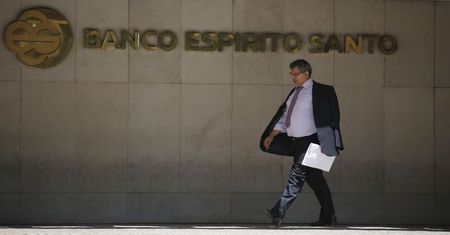By Laura Noonan and Andrei Khalip
LONDON/LISBON (Reuters) - Laws may have been broken at Portugal's Banco Espirito Santo (LS:BES) during a catastrophic six months that saw it lose 3.6 billion euros (2.8 billion pounds), the bank's new management said on Wednesday, as they vowed to raise new cash to bolster finances and to investigate the losses.
The Bank of Portugal announced hours later that BES's top risk management, compliance, supervision and audit officials had been suspended over suspected "harmful management" that may have contributed to the bank's massive losses. The regulator also barred ESFG, the holding company of the bank's founding family, from exercising any voting rights from its 20 percent stake in the bank.
The bank's losses - which prompted it to say it would immediately begin a process to raise more capital - came as BES's new management team sought to draw a line under a torrid few months dominated by fears about the bank's exposure to the troubled business empire of the Espirito Santo family.
Instead, the team, which was appointed on July 14, had to give fresh details of irregularities they had discovered in the way the bank dealt with family companies in the recent past.
IRREGULARITIES
The revelations included the fact that 120 million euros was loaned to a family company in June without passing through the bank's related party lending controls that are in place to approve such transactions.
The bank also said it had to take 856 million euros of provisions after it discovered two letters issued by the bank in favour of creditors of a family holding company, ESI, which were not registered in the bank's accounting records at the end of June.
In total, 2.1 billion euros of provisions were taken because of the bank's exposure to the Espirito Santo Group, which lost control of the bank in June but remains its largest shareholder with a 20 percent stake. Another 590 million euros hit was taken to cover repayment of debt issued by Espirito Santo Group companies to BES clients.
The bank also booked losses of 198.2 million euros for its troubled Angola unit and noted that it could lose its majority stake in the bank if it does not participate in the "substantial reinforcement of its equity" that it needs.
The Bank of Portugal said "forensic auditing" they ordered at BES will establish whether the bank's former chief executive, chief financial officer and other top executives that have stepped down bear individual responsibility for the losses. "In case illegal practices are confirmed ... possible consequences of criminal nature may follow," the regulator added.
"Regardless of this assessment of individual responsibilities, the acts harmful to BES interests are incompatible with officials in charge of auditing, compliance, risk management and supervision bodies remaining in their positions."
Senior officials at consultancy PwC will lead a "supervision commission" at BES until shareholders name new internal auditing officials, the Bank of Portugal said.
In its results statement, the bank said it would do all it could to ensure that it was reimbursed for any losses caused as a result of any potential illegal behaviour. The bank's former chief executive, Ricardo Espirito Santo Salgado, could not immediately be reached for comment.
BACK FOR MORE
The bank vowed to swiftly raise capital since the losses pushed BES's capital ratio to just 5 percent at the end of June, below the minimum 7 percent level required by regulators.
Bank of Portugal stressed that there was no immediate threat to the bank. "All the necessary conditions are in place for the bank to continue its activities and for the full protection of the rights of depositors," it said.
BES said it would raise enough money to give it a cushion above what it is legally required to hold, but did not immediately say how much cash it would seek. It said it would call a shareholders' meeting to approve the recapitalisation plans "within a reasonable time frame".
"Over the course of the past few weeks, both shareholders and potential investors have shown interest in participating in a capitalisation plan, some of them willing to take relevant stakes in the Bank," said Vitor Bento, the bank's chief executive.
The central bank said it would prefer if capital were raised from private sources, but that the country does have funds for a public bailout if needed.
BES last raised capital on June 10, selling 1 billion euros of shares to existing investors. A month later, as fears mounted about its exposure to the ailing Espirito Santo empire, BES said it had enough capital to withstand any losses on its 1.2 billion euros of lending to family companies.
Since then, three of the family's holding companies have applied for creditor protection in Luxembourg.
An investor who has been examining BES's situation said it could raise more private cash even though shareholders who put in money in June have seen their investments plummet by about 50 percent.
"To raise more capital, the market needs to get reassurance that the potential leakage points are known and there's not another possible source," he said.
The bank is also preparing a strategic restructuring plan that Bento said could lead to the sale of some of its international offshoots.
"Whilst this has been a difficult time for all stakeholders, we are now focussed on taking the necessary steps for the future and to place the bank on a sustainable financial footing for the future," he added.

(Reporting by Laura Noonan and Andrei Khalip; Additional reporting by Sergio Goncalves in Lisbon; Editing by Andrew Hay and Mohammad Zargham)
